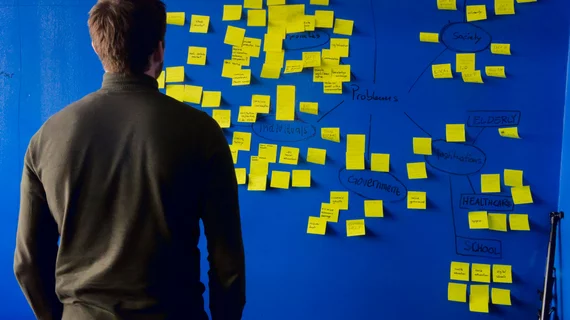Brainstorm, collaborate to save healthcare AI from a ‘failure of imagination’
AI proponents run little risk of underestimating the technology’s potential to transform healthcare. In fact, many seem to err on the side of hype. However, the bigger misstep may be failing to imagine the kinds of real-world problems the technology can solve.
The suggestion comes from a strategic communications professional who specializes in thinking creatively about how to unlock opportunities—including those that are, at present, hard to see.
U.S. healthcare “has been frequently caught off-guard by such ‘unexpected’ challenges as the rise of retail health, the demands of an aging population with increasing rates of chronic illnesses and EHR systems implemented without consideration for how they would exchange data, to name a few,” explains the thought leader, Denise Worrell. “At the time, these challenges seemed unimaginable. In retrospect, they were hiding in plain sight all along.”
Worrell, who’s in charge of innovation and transformation at the creative-services agency Langrand, airs out her cogitations in a piece published by MedCity News July 21. She writes:
‘AI represents the single biggest opportunity to fundamentally transform healthcare since antibiotics (sorry, fax machines). It isn’t too late for healthcare to prevent another failure of imagination.’
Worrell describes five ways to do just that.
1. Find the edge.
“Widen your focus beyond your organization and get inspired by investigating all the weird and wonderful ways people are leveraging AI to better their lives—financially, physically, emotionally, socially, spiritually and so on,” Worrell writes. “Now imagine how those ideas might be applied in healthcare—not just to improve current processes but also to overcome the challenges of the healthcare system that every stakeholder struggles with.” More:
‘Early AI adopters are already pointing to the answers; healthcare just needs to open its eyes (and mind).’
2. Embrace the genie.
“We can’t put AI back in the bottle,” she points out. “Instead of raging against the machine(s), spend your energy working to influence what is coming whether healthcare likes it or not.”
‘Make no mistake: this is a tool that has the power to redefine population health at a scale we’ve never even dreamt of. Why not harness that power in a way that works for everyone?’
3. Think like a patient.
“Instead of asking how AI can make your scheduling process more efficient, ask how AI might help patients find and schedule the care they need,” Worrell advises. “This small shift in perspective can make a big difference.”
‘By framing your use cases in a way that’s meant to benefit the people you serve, you’ll find yourself developing unexpected solutions that are more likely to get adopted and be successful. Win: win.’
4. Rethink the patient-provider dynamic.
“The time is coming when patients will come into their visits armed with more knowledge than their providers. (In fact, it might already be here.) No, they won’t have gone to medical school overnight, but they will have used AI to analyze their symptoms and home in on a few possible diagnoses.”
‘Patients may already know what tests need to be ordered to confirm a diagnosis or how their genotype might respond to a particular treatment. I say this not to discount the continued need for physicians but to pose the question: What might this future look like?’
5. Actively collaborate—not only with colleagues but also with consumers.
“The dynamics of care delivery have already begun to shift, whether healthcare likes it or not,” Worrell notes. “Artificial intelligence is so much more than a tool for maximizing internal efficiency: It’s an opportunity to think transformatively about the very nature of human well-being and the business of health. And it’s an opportunity to collaborate alongside healthcare consumers to shape what will be.”
‘Success will come when everyone’s lives are made simpler and more enjoyable. And failure? That comes when you fail to imagine what’s hiding in plain sight. Don’t let your imagination fail you now.’

